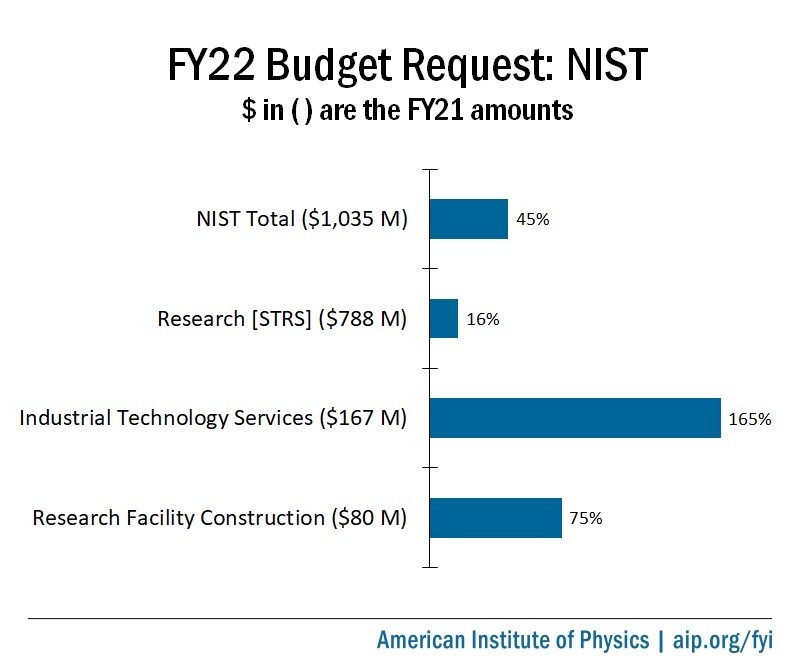
FY22 Budget Request: National Institute of Standards and Technology
In its fiscal year 2022 budget request
The administration retains a focus on priorities supported by NIST in recent years, such as artificial intelligence, quantum information science, and semiconductor research, and adds new emphases on diversifying the standards workforce and applying metrology to climate change monitoring and resilience. The administration also seeks major boosts for facilities repair and NIST’s advanced manufacturing programs, proposing to create two new Manufacturing USA institutes and expand the Manufacturing Extension Partnership.
Summary figures from the request are available in FYI’s Federal Science Budget Tracker

Laboratory programs
NIST’s laboratory programs are funded through the Scientific and Technical Research and Services account, which would increase by $128 million to $916 million under the request. Much of the additional funding would go to “four strategic focus areas”
Quantum information science. NIST proposes to increase funding for its Quantum Information Science, Engineering, and Metrology program by $15 million to $62 million. The program currently supports NIST’s Quantum Economic Development Consortium

An illustration of an atomic force microscope probing quantum Hall edge states in graphene.
(Image credit – Sungmin Kim / NIST)
Artificial intelligence. The budget for NIST’s program on “Partnerships, Research, and Standards to Advance Trustworthy Artificial Intelligence” would increase $15 million to $45 million under the request. Of the increase, $10 million would support the creation of a cross-sector institute that would help develop standards for trustworthy AI systems, in support of NIST’s Plan for Federal Engagement in Developing Technical Standards and Related Tools
Engineering biology. The budget for NIST’s program focused on supporting the “bioeconomy” would increase $14 million to $34 million. NIST states the funding would primarily go toward “developing capabilities for engineering biology, advancing biomanufacturing processes and technologies, and merging artificial intelligence with biological data to create new measurement technologies.” It also notes the program would help develop “rapid detection methods for infectious diseases and evaluation of vaccines and therapeutics that may reduce viral spread,” as well as “mitigate increased biosecurity risks posed by dual-use and emerging biotechnologies.”
Semiconductor research. NIST proposes to increase funding for next-generation semiconductor research and standards by $10 million to $35 million in order to modernize equipment at its campuses in Maryland and Colorado and create a research program focused on characterizing “physical properties of complex material and processing interactions at the nanoscale.”
Climate and environmental research. The budget for NIST’s Climate and Energy Measurements, Tools and Testbeds program would increase $18 million to $55 million under the request. Of the increase, $7.5 million is for development of climate-resilient building codes and standards, $5 million is for carbon capture and sequestration research, and $3.7 million is for smart grid research. The remainder is for greenhouse gas measurements and standards, enabling NIST to expand its Urban Dome emissions monitoring program to include more locations and accelerate development of models that offer emissions information “at scales useful for city and state-level mitigation efforts.” Through a separate program, NIST also proposes a $5 million increase for a “circular economy” initiative that aims to improve the recyclability of plastic materials.
Advanced communications. The budget for advanced communications research and standards-setting would increase by $12 million to $36 million under the request, supporting R&D to inform spectrum auctions for 5G systems and to lay the groundwork for “6G and beyond,” among other purposes. NIST states the work would “enhance U.S. influence in appropriate international standards development organizations” and enable the agency to “enhance its fierce advocacy efforts for U.S. industry in stakeholder groups related to supply chain innovation.” NIST also proposes to concentrate its advanced communications R&D efforts by transferring
User Facilities. NIST requests a $5 million increase to $60 million for the operations of its two user facilities: the Center for Nanoscale Science and Technology, which supports the fabrication and characterization of nanoscale materials and devices, and the Center for Neutron Research, a nuclear reactor facility for neutron-scattering research. The Center for Neutron Research is currently shut down due to a radiation incident in February, which NIST indicates
Diversity and inclusion. In support of President Biden’s executive order, “Advancing Racial Equity and Support for Underserved Communities Through the Federal Government,”
Facility repair and construction
NIST proposes increasing its facilities budget by 75% to $140 million, all of which would be allocated to repairing existing facilities. NIST notes it faces a large maintenance backlog and several urgent repair needs, describing recent water and electrical infrastructure failures at its campus in Maryland.
NIST does not request any funds for ongoing renovations to the main building on its Colorado campus, which it estimates will take $150 million to complete. In recent years, NIST sought to fund the project through a special capital account administered by the General Services Administration, but Congress did not accept the proposal.
Manufacturing programs
The budget for the Industrial Technology Services account would nearly triple under the request to $442 million, which would be split between NIST’s two manufacturing programs.
Under the budget request, the Manufacturing USA program budget would increase by $150 million to $167 million to create two new institutes. NIST currently supports one of the 16 institutes in the national network
The Manufacturing Extension Partnership program, which provides technical assistance to U.S. manufacturing businesses, would increase by $125 million to $275 million. NIST states the funding would support a “national supply chain initiative” as well as “create manufacturing technology demonstration workspaces to develop and deploy new services in key areas such as 3-D printing, Industry 4.0, flexible materials, and broadband technology.”
Manufacturing is a major focal point of the Biden administration’s economic policy, particularly in its multiyear American Jobs Plan, which proposes


